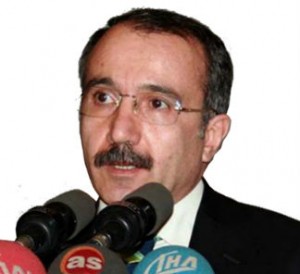Government to consider harsh criticism on education bill for undermining the schooling of girls
 Retreating amid a barrage of harsh criticism, the Turkish government promises to ‘ease concerns’ regarding a controversial draft to alter the education system
Retreating amid a barrage of harsh criticism, the Turkish government promises to ‘ease concerns’ regarding a controversial draft to alter the education system
Speaking in Antalya, Education Minister Ömer Dinçer says he understands the concerns voiced regarding the proposed changes in the education system. However, he rejects accusations that the changes will undermine the schooling of girls. AA photo
The government promised yesterday to ease concerns over a bill that would significantly alter Turkey’s education system, after a storm of criticism forced the bill’s submission to a parliamentary sub-commission, delaying a vote in the General Assembly.
“It is our duty to understand the concerns and eradicate them,” Education Minister Ömer Dinçer said in Antalya, adding that the decision to send the draft for possible revision to the sub-commission was made with the consent of the ruling Justice and Development Party.
Dinçer rejected accusations that the bill would undermine the schooling of girls, and stressed that the AKP had no intention of stepping back on incentives it had provided so far to encourage their education.
The bill ended up in a sub-commission late Feb. 23, after a stormy debate at Parliament’s Education Commission. The sub-commission is now scheduled to take up the draft Feb. 28. Revisions are possible, but the AKP is unlikely to back down from the main provisions. The AKP had originally planned to have the bill passed by the end of the month.
Even though the AKP presented the bill as a move to extend compulsory education from eight to 12 years, critics say it would actually open the door for conservative parents to take their daughters from school after a four-year primary education, and would cater to patriarchal traditions of marrying off underage girls.
The misgivings stem from a provision that would authorize the government to introduce home schooling after four years of basic education. Opponents say the article would allow parents to confine young girls to home, or to send them to Koranic courses instead, where they would be free to wear the Islamic headscarf.
Dinçer rejected the misgivings and said the provision would be used only in “exceptional cases” for disadvantaged groups such as handicapped children and inmates. The AKP had earlier said the provision also aims to provide child prodigies with special education at home.
Unrelenting criticismDespite the government’s assurances, the main opposition Republican People’s Party (CHP) called yesterday for the suspension of the bill and urged a wide public debate on what education reforms Turkey needs.
The CHP’s Aytun Çıray called on women to mobilize against the bill, warning that the AKP had designed a “stranglehold” for their future.
Oktay Vural of the Nationalist Movement Party (MHP) slammed the fact that the bill was submitted by five AKP lawmakers, without any prior public discussion. “The state’s institutions have been by-passed. Neither pedagogues nor civic groups have been asked for an opinion,” he said.
Prominent businesswoman Güler Sabanci also joined the criticism. “The main concern is that the number of child marriages and instances of child labor would increase,” she told reporters in Istanbul.
Under the bill, the education process would be divided into three tiers of four years each. That concept would allow the re-introduction of the imam-hatip vocational religious schools after primary education. The imam-hatip schools have been limited to the high-school level since the late 1990s, as part of a strict army-led secularist campaign that forced Turkey’s first Islamist prime minister, Necmettin Erbakan, to resign.
25.02.2012
SOURCE: HDN




